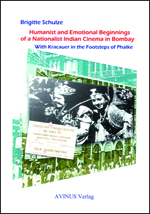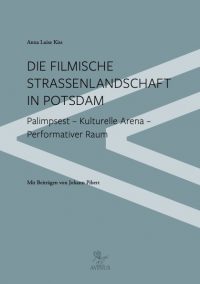Schulze – Indian Cinema
32,00 €
Humanist and Emotional Beginnings of a Nationalist Indian Cineman in Bombay. With Kracauer in the Footsteps of Phalke 419 S., engl., ISBN 978-3-930064-12-0, 32.00 EUR
Beschreibung:
‚Films made in Bombay‘ have a much longer and more complex history than ‚Bollywood‘; and what is widely projected as ‚authentically Indian‘ is a politicised and ideologically contested space since the first decades of the 20th century. How did the historical audiences in Bombay actually respond to the first „Indian films“, to an Indian filmmaker’s mediation of ideas and feelings of ‚being Indian‘? In what way did for instance in 1913-18 the first long narrative films by Dhundiraj Govind Phalke convey patriotic sentiments? These are some of the questions tackled by Brigitte Schulze, a sociologist and activist of Indian cinema cultures since the late 1980s. Exploring the beginnings of Bombay’s cinema means to enter spaces largely occupied by orientalist or nationalist myths; however, once these are critiqued her discursive and contextualising approach brings into light long forgotten visions and landscapes of a ‚cinematographic humanism‘ beyond caste, class, gender or nation-state.
See also review in Schnitt: http://www.schnitt.de/232,1173,01
„Die Autorin, deren Schrift bis dato nur in Englisch publiziert wurde, schärft so den Blick auf ein Kino, das Phalke politisierte und ideologisierte, um seine humanistischen, jenseits des Kastensystems funktionierenden Ideen via Zelluloid zu verbreiten. Eine Sammlung von Texten des Regisseurs und zeitgenössischen Artikeln über ihn runden das Buch zudem zu einer äußerst lesenswerten Reise ins frühe indische Kino ab, das zumindest im Sinne Phalkes ein etwas anderes werden sollte, als es heute ist.“ Michael Leuffen in Schnitt.
INHALTSVERZEICHNIS:
Overture
The Rosa of Early Cinema, Humanism and the Emotional Indian Self: New Views, Moving Experiences and Shifting Identities before 1918
Act 1
‚Colonial Subjects‘ and Early Cinema in Bombay: Questions about ‚Indianness‘ Arising from A Sociology of Early Cinema as Distinct from Film Studies
Act 2
„The Masses“ and „the Middle-Classes“: who are the Subjects of the Culture of Early Cinema in Bombay Around 1900?
Act 3
The Modern „National Theatre“: ‚Colonial Subjects‘ as Nationalist Public?
Act 4
Phalke’s ‚Cinema of t(T)ruth‘: ‚Colonial Subjects‘ as ‚Humanist‘ Public of a ‚World Culture‘ of Cinema?
Finale
Sociology of Cinema and Dissenting Views and Visions of Modernities: Recollecting the „Fragments“ of the 20th Century Modern Nation(s)
Appendix 1: Extracts from Phalke’s Articles
Appendix 2: Selected Texts on Phalke’s Cinema
Bibliography





